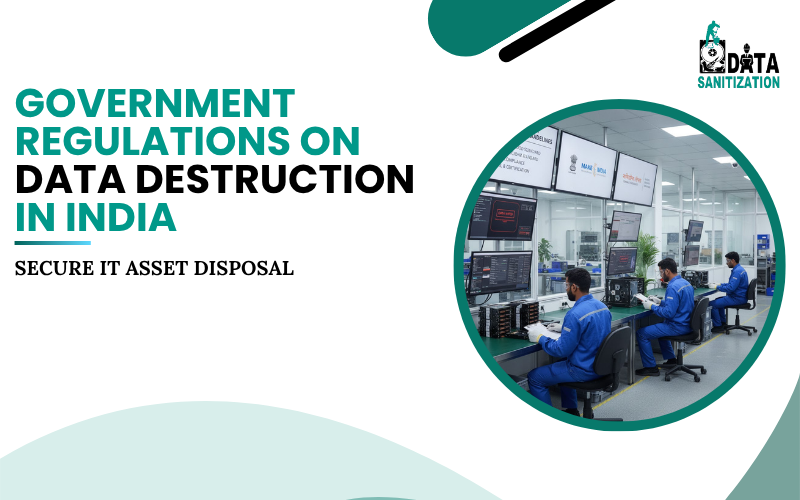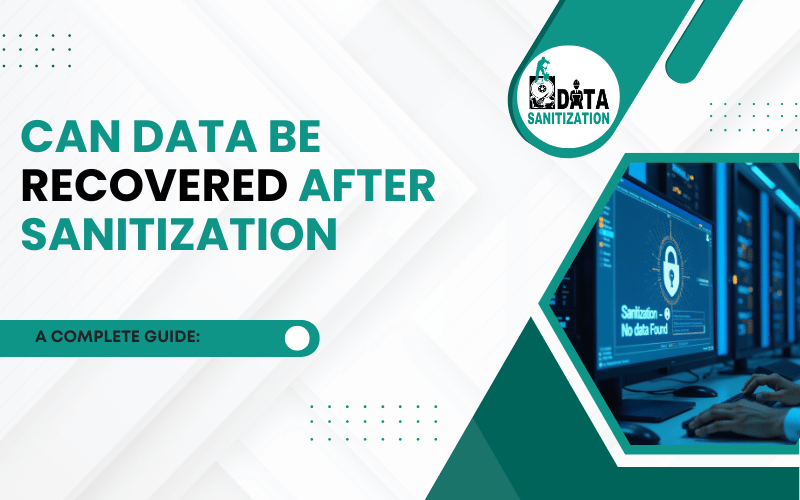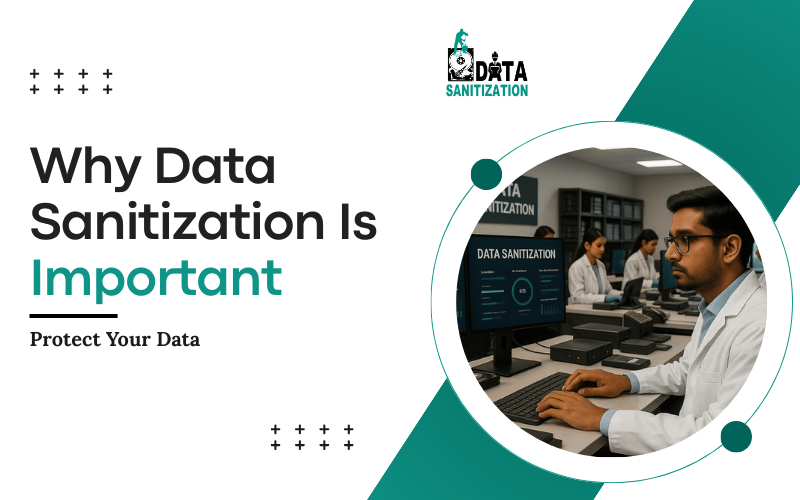In today’s fast-evolving digital landscape, data is an invaluable asset for businesses. However, as companies upgrade their technology and replace old hardware, it’s crucial to ensure that sensitive data is securely wiped before recycling or reselling IT assets.

Indian laws and government regulations surrounding data destruction aim to prevent unauthorized access to sensitive information and protect both personal privacy and national security. Failure to comply with these regulations can result in significant legal, financial, and reputational risks for businesses.
🛑 Why Data Destruction is Vital: The Risks of Ignoring It
When disposing of IT equipment such as hard drives, smartphones, or servers, many overlook the data security risks involved. Even if devices appear to be physically destroyed, traces of recoverable data can remain on the devices, leading to potential breaches. Here are some key risks associated with improper data destruction:
- Data breaches leading to theft of customer information, intellectual property, and financial data.
- Legal consequences for failing to comply with regulations protecting personal data.
- Reputational damage to a company’s brand and credibility, especially in industries dealing with sensitive customer information.
Given these risks, businesses must adhere to Indian laws and data protection regulations to ensure that data sanitization is carried out effectively before any IT assets are disposed of, recycled, or resold.
📜⚖️ Key Indian Regulations on Data Destruction

India has been stepping up its efforts to create a robust legal framework for data protection and cybersecurity. Here are the key regulations businesses must adhere to when it comes to data sanitization and IT asset disposal:
The Information Technology Act, 2000 (IT Act 2000)
The IT Act 2000 provides the foundation for data protection in India. Specifically, Section 43A of the IT Act mandates that companies must implement reasonable security practices to protect sensitive personal data or information (SPDI). Although the IT Act does not explicitly focus on data sanitization, it implies that businesses must securely destroy or erase sensitive data to prevent misuse or unauthorized access during disposal of IT assets.
Data Protection Bill (Personal Data Protection Bill, 2019)
The Personal Data Protection Bill, introduced in 2019, is India’s comprehensive data protection legislation. It includes provisions related to the secure destruction of personal data. Data controllers (companies handling personal data) are required to ensure that data is erased in a secure manner when it is no longer necessary for the purpose it was collected, which includes the decommissioning of IT assets. While the bill is still pending approval, its provisions will have a major impact on how data is handled, stored, and destroyed in the future.
The National Cyber Security Policy, 2013

The National Cyber Security Policy lays down broad guidelines for businesses and government agencies to ensure data protection and cybersecurity across India. The policy encourages businesses to implement practices for secure data storage and destruction of critical information, particularly in industries such as banking, finance, healthcare, and government sectors. This policy aligns with international standards and emphasizes the need for data sanitization during the disposal of IT assets.
ISO/IEC 27001:2013 (Information Security Management)
While ISO/IEC 27001 is an international standard, it is widely adopted in India. It focuses on the management of information security risks, including the need for secure data destruction. Organizations that seek ISO 27001 certification must follow recognized procedures for data sanitization before the disposal or recycling of IT assets. The standard provides best practices for securely wiping or destroying sensitive data.
Indian Penal Code (IPC) and Cyber Laws on Data Theft
Under the Indian Penal Code (IPC), data theft and cybercrimes can lead to severe penalties, including imprisonment and fines. If a business is found to have not properly sanitized or destroyed data on old IT assets, resulting in unauthorized access or data leaks, it could face criminal charges under the IPC or the Information Technology Act for cybercrimes.
🔐🌍 Why Secure IT Asset Disposal is Critical

India’s legal and regulatory landscape for data protection is evolving. As businesses comply with these laws, it is crucial to follow proper IT asset disposal procedures, including:
- Data Sanitization: Data sanitization is the process of permanently erasing data from storage devices so that it cannot be recovered or reconstructed. Businesses must follow secure data destruction practices in line with industry standards such as NIST 800-88 or ISO 27001.
- Physical Destruction of IT Assets: In some cases, especially for highly sensitive data, physical destruction (e.g., shredding hard drives) is required. This ensures that even the most advanced data recovery techniques cannot retrieve information.
- Compliance with Industry Standards: Companies dealing with sensitive information, such as in healthcare, banking, or government, must adhere to national and international standards for data sanitization and IT asset disposal.
🛡️ Best Practices for Secure IT Asset Disposal in India
To ensure compliance with Indian laws and safeguard your organization against legal and reputational risks, follow these best practices for IT asset disposal and data sanitization:

- Conduct Regular Data Audits: Ensure that you have a comprehensive inventory of all IT assets and the sensitive data they may contain. Perform audits regularly to check for obsolete or underused equipment.
- Partner with Certified Data Sanitization Service Providers: Collaborate with professional data sanitization companies that are certified to handle secure data destruction. These companies can ensure compliance with standards like NIST 800-88, ISO 27001, and FISMA.
- Ensure Proper Documentation: Maintain detailed records of your data sanitization and IT asset disposal process, including certificates of destruction from certified vendors. This documentation may be needed for audits or legal purposes.
- Ensure Secure Collection and Transport: If you are outsourcing the disposal of IT assets, ensure that the transport of your devices to the recycling or destruction facility is secure and that the provider has necessary certifications.
- Use Data Destruction Software: For large-scale data erasure, use certified software tools that can securely wipe storage media without leaving recoverable traces. These tools often comply with recognized standards like NIST.
📊 Conclusion: The Importance of Compliance with Indian Data Destruction Laws
As the Indian government continues to strengthen its data protection regulations, it is imperative for businesses to ensure secure data sanitization and IT asset disposal practices. Adhering to the IT Act, Personal Data Protection Bill, and industry standards will help businesses mitigate the risk of data breaches, avoid legal penalties, and safeguard their reputation.
By partnering with certified data sanitization services, organizations can rest assured that they are following the correct procedures for secure data destruction before recycling or reselling their IT assets.
📞 Contact Us for Secure Data Sanitization and IT Asset Disposal
At DATA SANITIZATION, we provide certified data sanitization services to ensure your business complies with Indian data protection laws. Securely dispose of your IT assets, protect sensitive data, and mitigate legal risks by trusting our professional team to handle your data destruction needs.
- 📧 Email: support@datasanitization.in
- 💬 WhatsApp Chat: Click below to instantly connect with us
- 🌐 Website: www.datasanitization.in
Need Onsite Data Sanitization Services?
Do you want Data Sanitization Services to be provided at your location? No worries!! We got it covered. Our team members will be appointed to finish the job at your location after you book the appointment with us. Please feel free to contact us.




